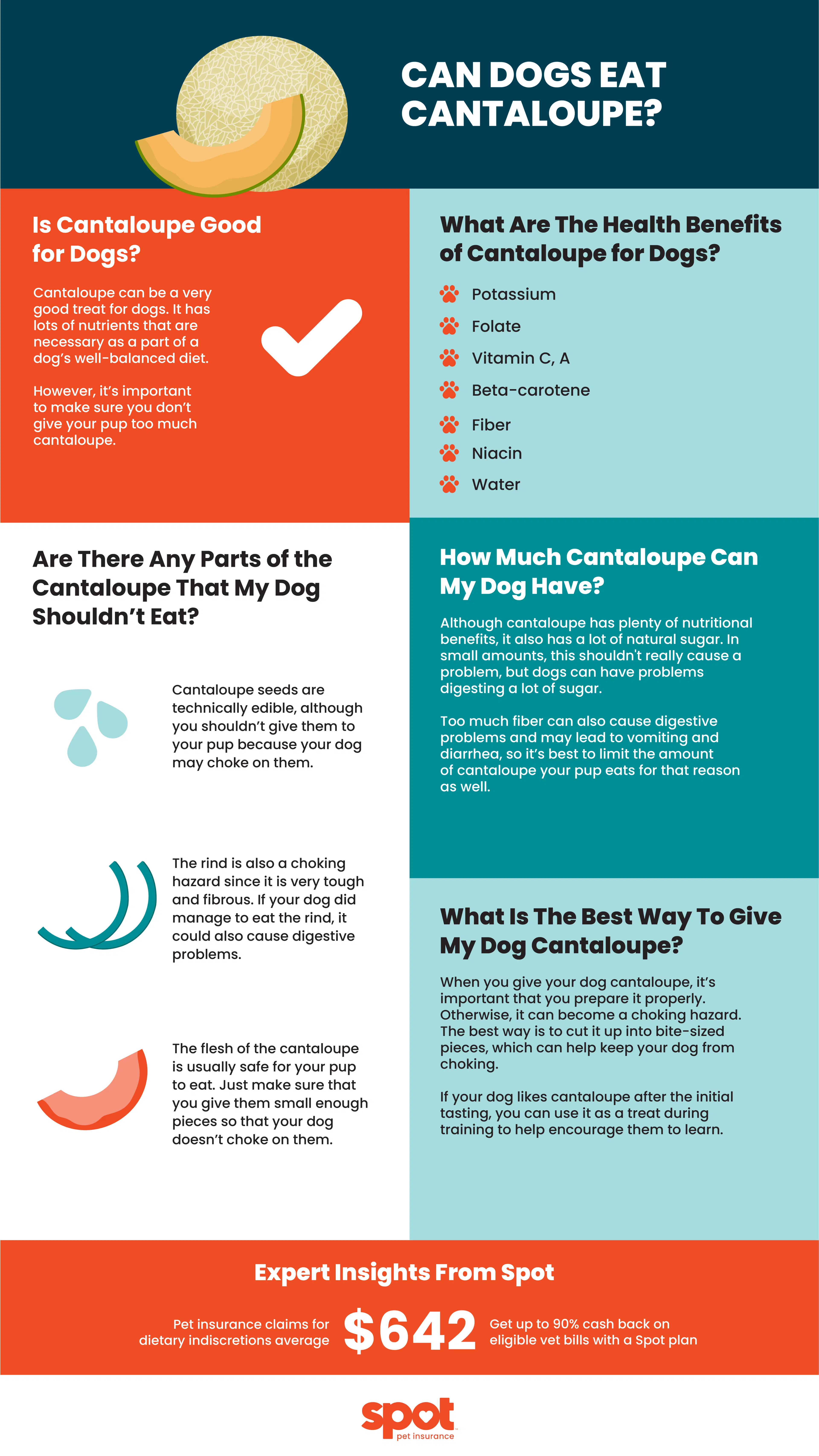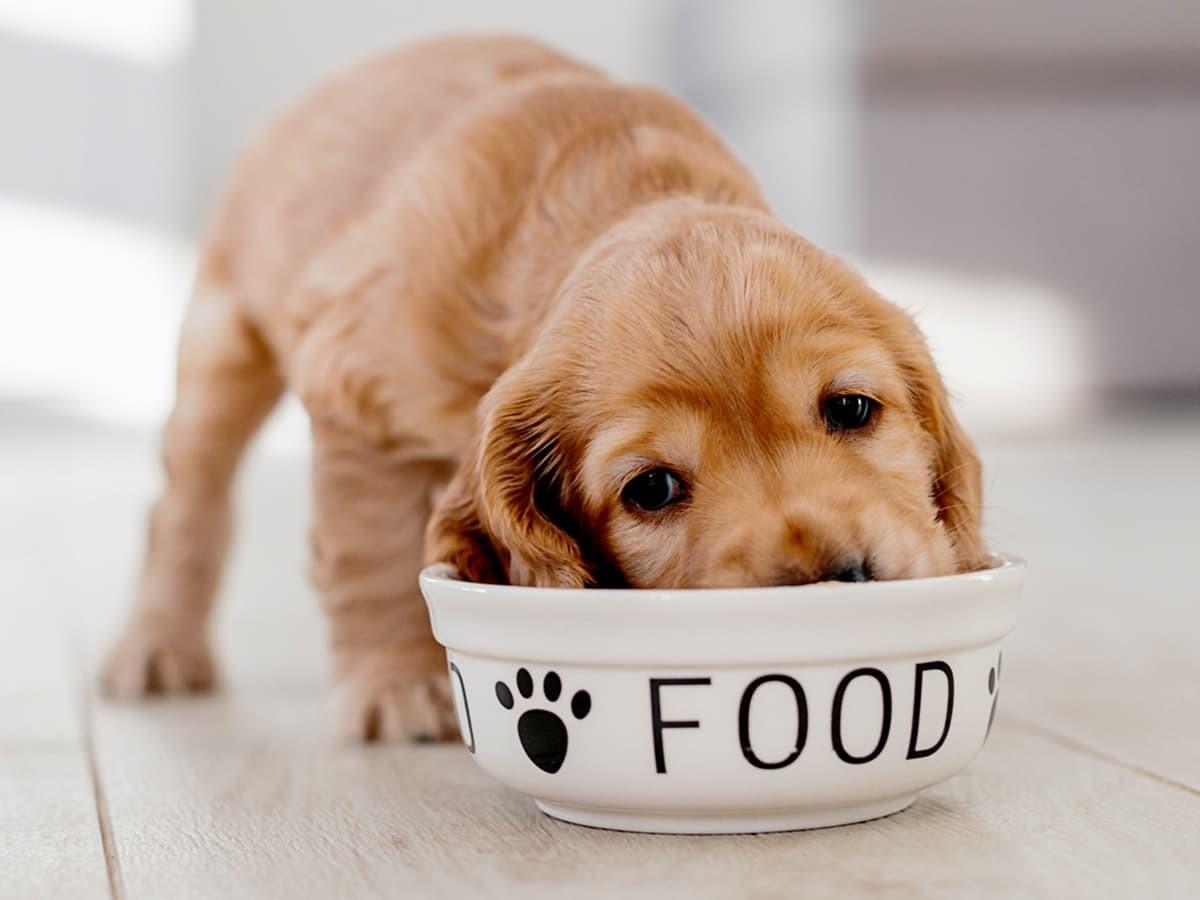As a good pet parent, one of your biggest concerns can be what your dog eats. After all, a balanced diet is important for your pup’s health and happiness. It’s also a fact that our pups can sometimes get into things that they’re not supposed to.
Sometimes people leave stuff out, and your dog decides to take advantage of the opportunity, and when that happens, it’s easy to get worried. What if your dog ate something they weren’t supposed to?
We’re here to help. At Spot Pet Insurance, we understand that being a pet parent can be pretty overwhelming. We’ve been there ourselves. It’s also pretty difficult to keep track of what your dog can and can’t eat. After all, there are a lot of foods to remember.
Cantaloupe, for example, is a delicious treat for spring or summer that humans enjoy, but can we share this fruit with our four-legged friends? Does it present any health risks, or does it have more health benefits?
By providing educational articles like this one, we hope to help good pet parents become better. We realize that being a pet parent is pretty hard, but we know that you’re taking the right steps to make sure that your dog can live a long and healthy life.
Cantaloupe is a fruit that can help us live healthier lives. Is it something that can help our pups be healthier too? Can dogs eat cantaloupe? Continue reading to find out.

Is Cantaloupe Good for Dogs?
Some fruits and vegetables are poisonous to dogs, but there are also plenty that can be great for dogs to eat. There are also the in-between foods, which aren’t necessarily good, but they also aren’t considered toxic.
Which category does the cantaloupe fall in? Cantaloupe can be a very good treat for dogs. It has lots of nutrients that are necessary as a part of a dog’s well-balanced diet.1 However, it’s important to make sure you don’t give your pup too much cantaloupe.
Although cantaloupe has plenty of health benefits, it’s technically considered to be a treat since it also has quite a bit of sugar. However, it also has plenty of vitamins, minerals, and fiber, which help your dog’s organs and systems function well.1
There are also parts of the cantaloupe that your dog should not be given. The flesh is the best part for both you and your pup. It’s also the easiest part to eat.
What Are The Health Benefits of Cantaloupe for Dogs?
Using cantaloupe as a treat for your pup can be a great way to provide incentives for your dog to listen to you during training, but it can function as more than just a treat.
Cantaloupe is an excellent treat for your dog to try. It contains plenty of nutrients, and it tastes good too. Some of the health benefits of eating cantaloupe are:2
Potassium
Folate
Vitamin C
Vitamin A
Beta-carotene
Fiber
Niacin
Water
Although there isn’t enough water in cantaloupe to replace the bowl of water you should have out for your pup, it can add some extra water to your pup’s diet. The high amount of fiber can help with constipation and other digestive issues.2
The other vitamins and nutrients in cantaloupe can help your pet’s immune system and skin health,3 making it look healthy and shiny. Some of these vitamins and minerals can help reduce inflammation.
What our pups eat helps them be strong and healthy throughout their lives, which is why it is so important to make sure that our pups are getting the nutrients they need through a well-balanced diet, and cantaloupe has the nutrients necessary to be an excellent choice for a treat.
Are There Any Parts of the Cantaloupe That My Dog Shouldn’t Eat?
Cantaloupes are a delicious fruit, but that doesn’t apply to all of this melon. There are some parts of the cantaloupe that you shouldn’t give your dog, mainly because they are a choking hazard.
It’s pretty common for fruit seeds to be poisonous, so, as a general rule, you shouldn’t give your pup any seeds unless you’ve done your research. Cantaloupe seeds are technically edible, although you shouldn’t give them to your pup because your dog may choke on them.
The rind is also a choking hazard since it is very tough and fibrous. If your dog did manage to eat the rind, it could also cause digestive problems, so it’s very important to keep the rind of the cantaloupe out of your dog’s reach.2
The flesh of the cantaloupe is usually safe for your pup to eat. Just make sure that you give them small enough pieces so that your dog doesn’t choke on them.
How Much Cantaloupe Can My Dog Have?
Although cantaloupe has plenty of nutritional benefits, it also has a lot of natural sugar. In small amounts, this shouldn't really cause a problem, but dogs can have problems digesting a lot of sugar.
Too much fiber can also cause digestive problems and may lead to vomiting and diarrhea, so it’s best to limit the amount of cantaloupe your pup eats for that reason as well.1
Fruits like cantaloupe, blueberries, or pineapple are great alternatives for doggy biscuits because they can help make up for the nutrients that would be lost by replacing kibble with treats.
It’s also a good idea to talk about your dog’s diet with your vet. They can give you advice on what your dog needs and how many treats, whether doggy biscuits or fruits, are acceptable. Policyholders of a pet insurance plan provided by Spot have access to a 24/7 pet telehealth service provided by VetAccess™.
A vet’s advice on changing your pup’s diet can help you ensure that you are making the right choice.
What Potential Problems Do I Need To Look Out for With Cantaloupe?
When you introduce your pup to new foods, it’s important to keep an eye out for potential problems. Some dogs can have a sensitivity to some kinds of fruit, and some can have allergies.
If your dog has an allergy or a sensitivity, you’ll probably notice some digestive issues, like gas or diarrhea. Depending on the severity of the allergy, you might also start to notice your pup itching or developing a rash or hives.3
If you notice any of these symptoms, you should stop giving your pup cantaloupe and talk with your vet about the potential for allergies.
Expert Insights From Spot
While sharing our favorite foods with our pets can be tempting, it's important to remember that not all human foods are safe for dogs. Spot's internal data shows that pet insurance claims for dietary indiscretions average $642*, highlighting the importance of caution and research before sharing snacks with your pet.
What Is The Best Way To Give My Dog Cantaloupe?
When you give your dog cantaloupe, it’s important that you prepare it properly. Otherwise, it can become a choking hazard. The best way is to cut it up into bite-sized pieces, which can help keep your dog from choking. The actual size of the cantaloupe pieces will depend on the size of your pup.
If your dog likes cantaloupe after the initial tasting, you can use it as a treat during training to help encourage them to learn. If your dog likes mental challenges, you could also put cantaloupe in a puzzle toy for your dog to solve and win the treat.
A Delicious Healthy Doggy Treat
Cantaloupe can be a yummy fruit with lots of nutritional benefits for our pups. It contains plenty of vitamins and minerals to help them with bone strength, digestion, and strengthening of the immune system.2
Cantaloupe can be a great treat in small doses, but too much can cause digestive issues, especially since dogs can have trouble digesting sugar.2
As a good pet parent, your dog’s health is one of your biggest priorities. All dogs need exercise and a well-balanced diet so they can live a long and happy life with you.
Whether you’re just thinking about making your dog’s meals yourself or worried that someone might drop some cantaloupe on the floor, one of our biggest priorities is making sure that you are an informed and prepared pet parent. After all, we want you and your pup to enjoy life to its fullest.
Other Fruits That Are Safe for Your Dog To Eat
If your dog tends to turn up its nose at a treat that’s been offered many times before, or if you simply want to add variety to their diet, you can try these fruits as well:
Remember that grapes and raisins are never fruits you should feed your dog. These have particular enzymes in them that are toxic to dogs4—avoid grapes and raisins around your dog like you avoid chocolate! We have compiled a big list of all the fruits your dogs should eat here.
Dogs can eat sweet potatoes and many other vegetables instead.

I've had the privilege of immersing myself in the realm of pet safety. As the owner of an energetic mini golden doodle, I know just how stressful being a pet owner can be. I am dedicated to ensuring our beloved pets enjoy a life brimming with good health.
*Jan 2019 to Aug 2024 administrator claims data.
“Can Dogs Eat Cantaloupe?” PetMD, 29 Sept. 2022, www.petmd.com/dog/nutrition/can-dogs-eat-cantaloupe.
Burke, Anna. “Can Dogs Eat Cantaloupe? Is Cantaloupe Good for Dogs?” American Kennel Club, American Kennel Club, 9 July 2024, www.akc.org/expert-advice/nutrition/can-dogs-eat-cantaloupe/.
“Can Dogs Eat Cantaloupe?” Wag!, Wag!, 14 June 2024, wagwalking.com/wellness/can-dogs-eat-cantaloupe.
Segal, Dayva. “Can Dogs Eat Fruit? Which Ones Are Safe?” WebMD, WebMD, 12 Feb. 2024, www.webmd.com/pets/dogs/what-are-safe-fruits-for-dogs-to-eat.
The information presented in this article is for educational and informational purposes only and does not constitute or substitute for the advice of your veterinarian.












